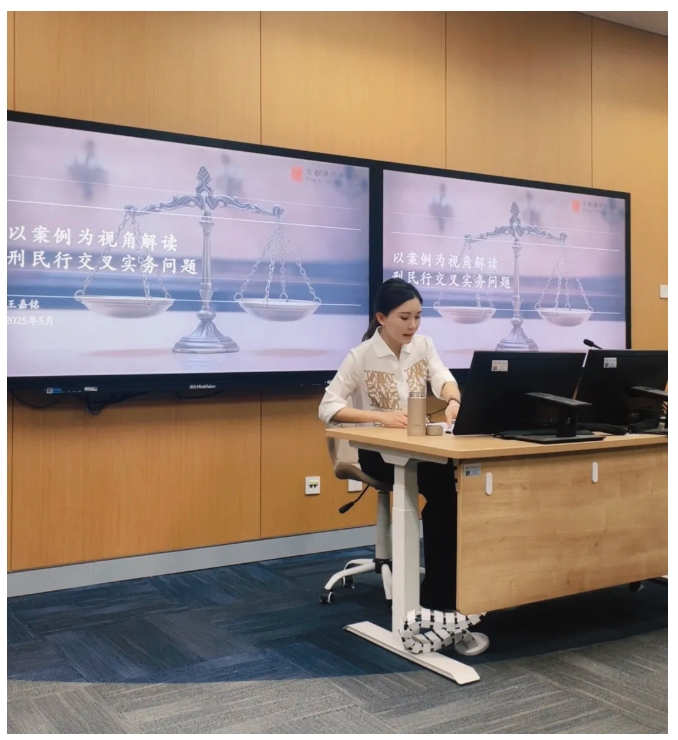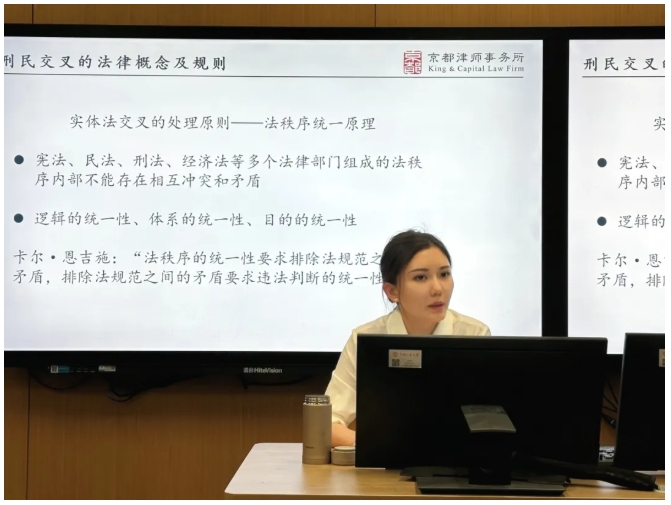On May 7, 2025, Mr. Wang Jiaming, partner of Beijing King&Capital Law Firm, was invited by the School of Law of Renmin University of China to give a rich and wonderful lecture to the doctoral and master students of the School of Law with the theme of “Interpretation of criminal, civil and administrative cross-practice issues from the perspective of cases”. The lecture was hosted by Mr. Li Fenfei, PhD supervisor and dual-appointed professor of School of Law of Renmin University of China and School of Discipline Inspection and Supervision of Renmin University of China.

Mr. Wang Jiaming started to discuss the substantive issues of the intersection of criminal and civil law, combining Rousseau's “Social Contract” and German jurist Karl Engisch's “Monism of Illegality”, and explored how to strike a balance between respecting the autonomy of the civil subject and the discretion of administrative supervision in criminal law. He discusses how criminal law can strike a balance between respecting the autonomy of civil subjects and the discretion of administrative supervision. At the same time, Mr. Wang pointed out that, the procedural connection between criminal and civil proceedings is often deviated from the judicial practice due to the confusing regulations. Especially, in the procedure of connection between criminal and administrative proceedings involving statutory offenses, due to the inconsistency between the standard of proof for administrative offenses and the standard of proof for criminal offenses, the criminal procedure should be more concerned about whether the criminal procedure can reach the standard of evidence for convicting and sentencing the offenses of statutory offenses, instead of following the logic of the administrative authorities' determination of the illegal facts. The logic of the administrative organ's determination of the fact of violation and the conclusion of punishment.

In the process of teaching the substantive and procedural issues of criminal-civilian-commercial intersection, Lawyer Wang Jiaming reviewed the changes in the legal provisions of China's judicial organs in dealing with such issues, and through a large number of case analyses and practical interpretations, focused on explaining the difficulties in the articulation of the three major areas and the path to break them down, and she took the procedural rules of criminal-civilian intersection cases in the Proceedings of Civil and Commercial Trial Work Conference of the National Courts of 2019 as the She took the procedural rules on criminal-civil intersection cases in the Proceedings of the National Court Civil and Commercial Trial Conference in 2019 as an entry point, systematically sorted out the evolution of the scope of application of the principle of “criminal before civil”, and combined the dispute over the shareholding of a listed company with the related criminal fraud case to reveal how to realize accurate triage through the “same fact” standard in the case of criminal-civil procedural intersection.

In addition, Mr. Wang devoted himself to the theoretical research and practical handling of securities crimes involving listed companies, which are mostly presented in the form of statutory and administrative crimes. Therefore, in the case sharing session, Mr. Wang analyzed the key points and difficulties involved in the convergence of execution and punishment in the insider trading, manipulation of the securities market, and violation of the disclosure of information, which broadened the theory of thesis research of the graduate students, and provided a good opportunity for the students to learn about the development of the criminal procedure and its interface with the civil procedure. Graduate students' thesis research has broadened the theoretical ideas and enriched the practical perspective.
The lecture was detailed and logical, Wang Jiaming, with his solid legal literacy and rich experience in handling cases, analyzed many hot issues in the intersection of criminal, civil and administrative fields, which not only broadened the academic horizons of the students, but also strengthened their perception and sense of responsibility for legal practice, which is of great significance for the future practice of law.
In the interactive part of the lecture, Wang Jiaming combined with practical case experience, patiently answered the students on the practice of criminal and civil cross-research confusion, for the “Private Economy Promotion Law” after the introduction of the legal application of the new “Supervision Law” after the implementation of the Supervision and Inspection of the convergence of the problem, as well as common crimes in the execution of the criminal in the reverse convergence of the problem were carried out to answer the question and interaction, she encourages the young people of the law will be jurisprudential thinking and practical operation closely integrated, focusing on the cultivation of the “legal practice”, and the “legal practice”. She encouraged the young lawyers to combine legal thinking with practice, and emphasized the cultivation of “three lines of thinking” - adhering to the bottom line of the law, adhering to the main line of evidence and anticipating the red line of risk.
At the end of the interaction, she sent a message to the students to pay attention to the top-level design trend of “criminal, civil and administrative synergistic governance” in the judicial reform, and to broaden the cross-disciplinary vision while deepening their specialization, so as to lay a solid foundation for the future response to the new type of composite legal disputes.



